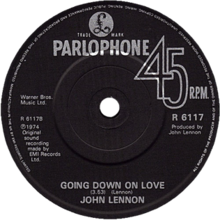Going Down on Love
| "Going Down on Love" | ||||
|---|---|---|---|---|
 B-side label of UK single | ||||
| Single by John Lennon | ||||
| from the album Walls and Bridges | ||||
| A-side | "Jealous Guy" | |||
| Released | 18 November 1985 (UK) | |||
| Recorded | 1974 | |||
| Genre | Rock | |||
| Length | 3:54 | |||
| Label | Apple Records | |||
| Songwriter(s) | John Lennon | |||
| Producer(s) | John Lennon | |||
| John Lennon singles chronology | ||||
| ||||
| Walls and Bridges track listing | ||||
12 tracks | ||||
"Going Down on Love" is a song by John Lennon, released as the first track on his 1974 album Walls and Bridges.[1] It was also released as the B-side of Lennon's "Jealous Guy" single in 1985.[1]
Lyrics & music
[edit]The lyrics of "Going Down on Love" reflect Lennon's feelings during his so-called "lost weekend" separation from wife Yoko Ono.[2][3] As such, it sets the tone for the entire Walls and Bridges album.[3] Lennon laments the fact that even though his life at the time looked like fun, he actually needed to be rescued from his pleasure seeking, loveless situation.[2][3] The singer accepts his loss of his "precious and rare" love as the price for his past abuses.[2][4] Authors Chip Madinger and Mark Easter describe the lyrics as being as frank as the lyrics of the songs on John Lennon/Plastic Ono Band.[5] Ben Urish and Ken Bielen describe the lyrics as "bleak."[4]
The title phrase incorporates a sexual pun.[2][4][6] The phrase "going down on love" is used in the song in the context of "giving up on love."[4] He even adds that he "got to get down, down on my knees," which in a literal sense would mean he is on his knees pleading for help or begging for forgiveness.[4][6] But these phrases also imply a sexual act, although part of the joke seems to be that within the song neither the stated romantic longings or the implied sexual desires are fulfilled.[4] Andrew Jackson, however, takes the title phrase combined with the pun to imply a promise by Lennon to be a better lover if Ono takes him back.[6]
"Going Down on Love" opens with a percussion accompaniment that author Andrew Jackson compares to Marvin Gaye's "What's Going On" and "Mercy Mercy Me (The Ecology)," albeit slower.[6] The song alternates between slow, smooth sections and sections with a funky rhythm punctuated by bongo drums.[4] Urish and Bielen believe that this approach generates a "feeling of nervous energy," which they consider appropriate to the song's anxious and resigned mood.[4] Although it is a "song of loss," music critic Johnny Rogan states that the "jaunty tone" of the song produces an effect of irreverence and defiance.[1] Rogan finds the two most notable elements of the song are Lennon's "strident" vocal and Bobby Keys' horn arrangement.[1] The phrase "Somebody please, please help me" is sung to a similar melody, albeit at a slower tempo as the similar phrase Lennon sang in the Beatles' song "Help!"[4]
According to Madinger and Easter, the recording and mixing of "Going Down on Love" are crisper than on many other Lennon songs.[5]
Reception
[edit]Rock journalist Paul Du Noyer notes the irony that although the lyrics contain the line "Nothing doin' nowhere," in a creative sense there was more going on here and throughout the Walls and Bridges album than on Lennon's recordings in recent happier times.[3] Author John Blaney notes that the song is "as raw and honest as anything [Lennon had] written," adding that Lennon was often at his best creatively when dealing with difficulties.[2] Madinger and Easter call it a "terrific LP opener."[5]
Personnel
[edit]The musicians who performed on the original recording were as follows:[2]
- John Lennon – vocals, guitar
- Nicky Hopkins – piano
- Jesse Ed Davis – electric guitar
- Eddie Mottau – acoustic guitar
- Ken Ascher – electric piano
- Klaus Voormann – bass
- Arthur Jenkins – percussion
- Jim Keltner – drums
- Bobby Keys, Steve Madaio, Howard Johnson, Ron Aprea, Frank Vicari – horns
References
[edit]- ^ a b c d Rogan, J. (1997). The Complete Guide to the Music of John Lennon. Omnius Press. pp. 88, 154–155. ISBN 0711955999.
- ^ a b c d e f Blaney, J. (2007). Lennon and McCartney: together alone : a critical discography of their solo work. Jawbone Press. pp. 93, 95. ISBN 9781906002022.
- ^ a b c d du Noyer, P. (1999). John Lennon: Whatever Gets You Through the Night. Thunder's Mouth Press. p. 83. ISBN 1560252103.
- ^ a b c d e f g h i Urish, B.; Bielen, K. (2007). The Words and Music of John Lennon. Praeger. p. 57. ISBN 978-0-275-99180-7.
- ^ a b c Madinger, C.; Easter, M. (2000). Eight Arms to Hold You. 44.1 Productions. pp. 94, 98. ISBN 0-615-11724-4.
- ^ a b c d Jackson, A.G. (2012). Still the Greatest: The Essential Solo Beatles Songs. Scarecrow Press. p. 145. ISBN 9780810882225.
